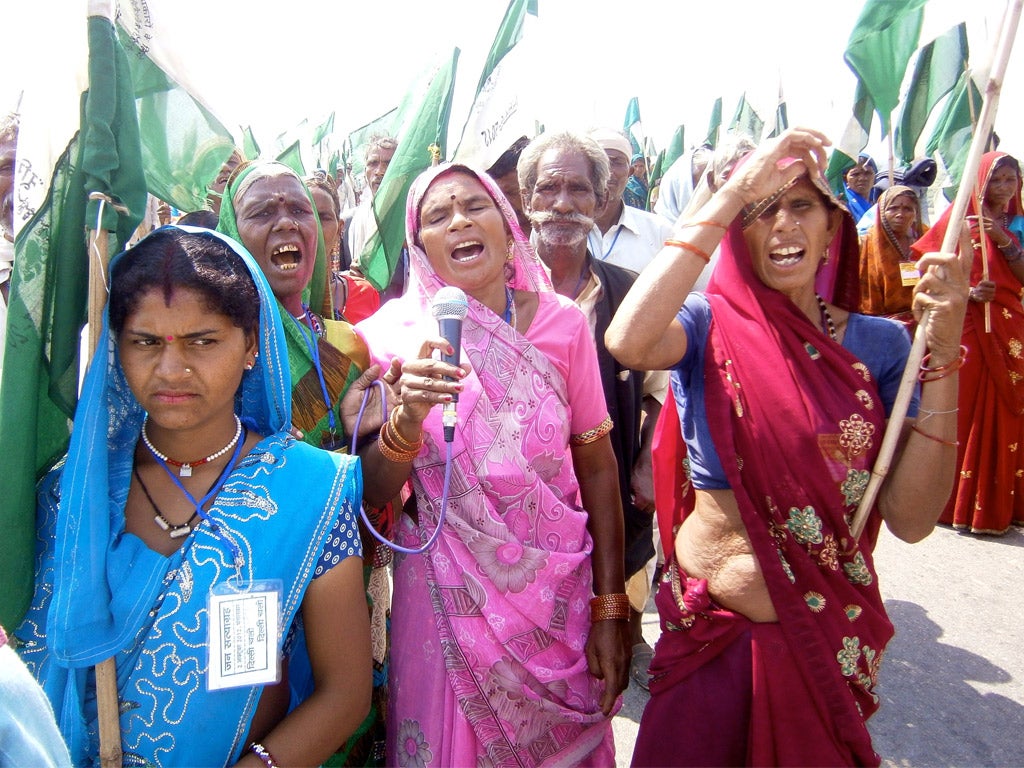Peasants' revolt: Rural India marches on Delhi for rights to live off the land
Andrew Buncombe joins tens of thousands of country's 'landless poor' during protest march to the capital

They marched in lines – noisy yet disciplined, footsore but determined. At one point, the marchers and their green and white banners stretched for more than two miles.
Tens of thousands of India's poorest citizens are on a march to Delhi to demand the government to give them land on which to live and from which to earn a livelihood. They insist it is a fundamental right and that they will besiege the capital unless their demands are met.
"We don't have any land. I'm here today because we are landless," said Ram Pyari Bai, a 60-year-old woman, her grey hair tied back beneath a red-and-white scarf. "I voted for the government and now the government should give me land and water to drink."
Across the developing world, clashes between the landless and the authorities are increasingly common. From Indonesia to Brazil, to Burma and Thailand, land-rights activists have been harassed, jailed and murdered. Almost every week, a new confrontation takes place as more people are displaced from their land for industrial projects, mining or else slum "rehabilitation".
There are fewer places where the plight of the landless is more pressing than in India, where more than 70 per cent of the population still relies on agriculture.
After India gained independence in 1947, the authorities did enact some reforms, unlike in Pakistan where feudal landowners remain commonplace. But activists estimate that today more than 20 per cent of the population is without land. It is a situation that is resulting in conflicts as well as vast mass migration to overburdened cities. The situation is further complicated because land reform is an issue for both the federal and state governments.
Earlier this year, a group of security experts and former bureaucrats told a conference in Delhi that land reform could halt the spread of Maoist-inspired rebels, who have increasingly taken a grip in the most remote parts of the country. The march to Delhi has been organised by an activist group, Ekta Parishad ("Unity Forum"), and its founder Rajagopal P V. The aim of the non-violent movement is to force the government to enact comprehensive reform and help the most marginalised within society. It insists there is plenty of land available to meet its demand.
"When people say there is no land for the poor, why is it that when Tata or Vedanta or any other big company says they want land, they can find 5,000 or 10,000 acres in 15 minutes," said Rajagopal, sitting beneath a yellow awning as marchers took a break for lunch. "Why is there no land for the poor, but land for the rich?"
Without land of her own, said Ram Pyari Bai, who had come from a village in Madhya Pradesh, she was obliged to work on other people's acres. She laboured for eight hours a day and in exchange received a 5kg bag of wheat or 100 rupees (£1.18). If her family – two sons and a husband who could no longer see – were particularly hungry she took the wheat, but if there were things she needed to buy she opted for the cash. She and her family lived in a shack made of twigs and plastic sheeting.
Her situation was not unusual. Also among the estimated 45,000 marchers was Sanju Devi, a 40-year-old woman who had travelled from Bodh Gaya in Bihar for the march. Mrs Devi, who has three children, said she and her husband worked land belonging to other people. In exchange she received 2.5kg of wheat while her husband earned 3kg. They were never given the option of being paid in cash.
The Indian authorities have suggested they intend to respond to the marchers' demands, perhaps as early as today. Whether they are prepared to meet all the demands – including around one-10th of a hectare to build a house for all those without land – is unclear, but reports in India's media said the government will agree to land reforms within six months and a new land census. The Rural Affairs Minister, Jairam Ramesh, indicated to reporters earlier this week that some sort of deal could be announced in Agra, saying: "The nation will get happy news from the city of the Taj Mahal."
Khet Singh, a gap-toothed farmer from Madhya Pradesh, was also among the marchers who set off from the town of Gwalior at the beginning of October. He was unsure of his age and when asked, he stroked a white beard and replied: "You tell me."
Mr Singh said he had neither land nor a house and that his sons had moved to the city of Nagpur in search of work. He said as he had got older, the occasions on which he was hired to work in other people's fields had become increasingly rare.
He was lucky if he received two meals a day. "My true prayer is that today we are going to get our demands and that they will listen to us," he said, adding: "If the government does not give us land then I might as well hang myself."
Subscribe to Independent Premium to bookmark this article
Want to bookmark your favourite articles and stories to read or reference later? Start your Independent Premium subscription today.

Join our commenting forum
Join thought-provoking conversations, follow other Independent readers and see their replies